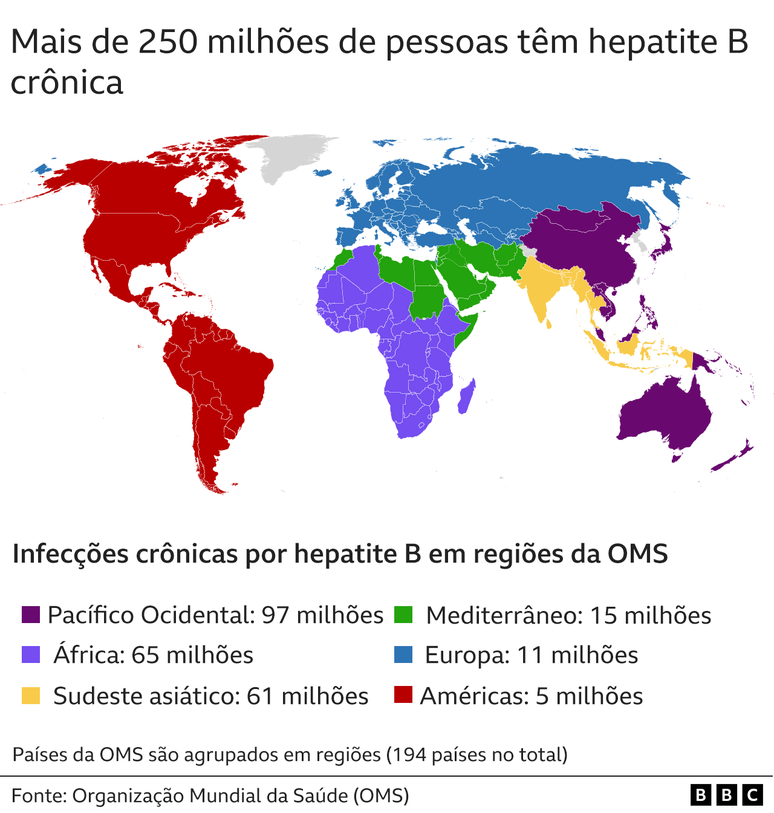The disease kills 1.3 million people a year, and many people don’t even know they might have the virus.
Health authorities and non-governmental organizations are urging people to get tested for hepatitis, as millions of people around the world are unknowingly carrying the disease.
The message is reinforced this week, on the eve of World Hepatitis Day, Sunday (28/7).
Hepatitis kills more than a million people a year – and the number is growing.
What is hepatitis and why is it so deadly?
Hepatitis is an inflammation of the liver, usually caused by a viral infection. It can cause various liver problems, including cancer.
There are five types of viruses, from A to E. Hepatitis B and C are the most dangerous. The World Health Organization (WHO) estimates that 1.3 million people worldwide die from diseases caused by hepatitis. This equates to one death every 30 seconds.
In Brazil, the most common viral hepatitis is caused by viruses A, B and C. There are also, less frequently, the hepatitis D virus (more common in the northern region of the country) and the hepatitis E virus, which is rare.
According to the Ministry of Health, the mortality rate due to hepatitis C can be compared to that of HIV and tuberculosis.
How common is hepatitis?
WHO estimates that 254 million people are living with chronic hepatitis B and 50 million with chronic hepatitis C. More than two million new cases occur each year.
Hepatitis B affects:
- 97 million people in the WHO Western Pacific Region (which includes China, Japan and Australasia) are chronically infected
- 65 million people in Africa
- 61 million people in the WHO region called South-East Asia (which includes India, Thailand and Indonesia).
WHO says hepatitis E infects 20 million people each year worldwide and caused 44,000 deaths in 2015. It is most common in South and East Asia.
Last year’s data in Brazil estimated that 520,000 people had hepatitis C, but were undiagnosed and untreated. By 2022, about 150,000 people would have been diagnosed, treated and cured of hepatitis C, the Brazilian government says.
In the case of hepatitis B, the official estimate is that nearly 1 million people in Brazil have the virus, and of these, 700,000 have not yet been diagnosed. According to data from the Ministry of Health, by 2022, the disease had been diagnosed in 264,000 patients and 41,000 were being treated.

How do you get hepatitis?
Hepatitis A is contracted by eating or drinking food and liquids contaminated by feces or through direct contact with an infected person.
It is common in low- and middle-income countries where health conditions are poor.
Symptoms disappear after a short time and most people recover. But it can cause fatal kidney problems.
Hepatitis A usually occurs in outbreaks in places with contaminated food and water, as occurred in Shanghai, China, in 1998, when 300,000 people were infected.

Hepatitis B is usually transmitted:
- from mother to child, at birth
- of contact between one child and another
- from syringes, needles, tattoos, piercings, or exposure to blood and body fluids (such as during sex)
Hepatitis C and D are also spread through contact with infected blood, such as sharing needles and syringes, or through transfusion of contaminated blood.
Only people with hepatitis B can get hepatitis B. This happens to about 5% of people who have chronic hepatitis B infection and makes the infection very intense.
Hepatitis E is spread through consuming contaminated water or food. It is most common in South and East Asia and is especially dangerous for pregnant women.
How do I know if I have hepatitis?
The most common symptoms are:
- fever
- fatigue
- loss of appetite
- diarrhea
- nausea
- pain in the stomach area
- light colored stools and dark urine
- yellow eyes
What are the tests and treatments for hepatitis?
You can get blood tests for hepatitis A, B, and C.
There is no specific treatment for hepatitis A. But most infected people tend to recover quickly and develop immunity.
Chronic hepatitis B and C can be treated with antiretroviral drugs, which slow the progression of cirrhosis and the chance of developing liver cancer.
There are vaccines that prevent hepatitis A and B. Given to babies at birth, the hepatitis B vaccine prevents transmission of the disease from mothers – and also protects against hepatitis D.
There is no vaccine for hepatitis C, and the hepatitis E vaccine is not widely distributed.
What is the prevention to avoid contracting hepatitis?

According to WHO, hepatitis A can be prevented in the following ways:
- wash your hands often before eating or after using the bathroom
- provide clean water to communities
- adequate wastewater treatment in communities.
WHO says hepatitis B, C and D can be prevented:
- practice safe sex, use condoms and reduce the number of sexual partners
- Avoid sharing needles when using drugs or getting tattoos or piercings
- If you have hepatitis B, wash your hands when you come into contact with blood, body fluids or contaminated surfaces
- in the case of hepatitis B, get vaccinated. Vaccines taken during childhood last about 20 years
Hepatitis E can be prevented by practicing good hygiene and cooking liver meat, especially pork liver, for a long time.
What are the authorities doing to eradicate hepatitis?
WHO says it wants to reduce the number of people contracting hepatitis B and C by 90% and the number of deaths by 65% by 2030.
But the agency warns that deaths from the hepatitis virus are on the rise. Recent data shows there has been an increase from 1.1 million in 2019 to 1.3 million in 2022.
Hundreds of millions of people still struggle to get tested for hepatitis because only 60 percent of countries worldwide offer free or subsidized testing and treatment. In Africa, the WHO says only a third of countries offer such testing.
Source: Terra
Ben Stock is a lifestyle journalist and author at Gossipify. He writes about topics such as health, wellness, travel, food and home decor. He provides practical advice and inspiration to improve well-being, keeps readers up to date with latest lifestyle news and trends, known for his engaging writing style, in-depth analysis and unique perspectives.






